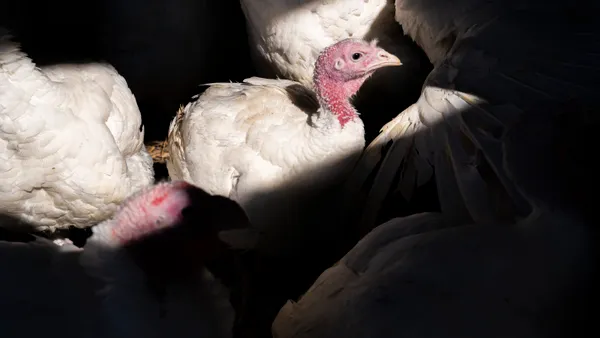Dive Brief:
- The Agriculture Department on Monday finalized a rule that eggs, meat and poultry products can only bear the voluntary "Made in the USA" label if animals were raised, slaughtered and processed within the U.S.
- The labeling requirements, set to go into effect Jan. 1, 2026, close a loophole that allowed processors to claim their products are of U.S. origin even if animals were imported.
- The rule is part of a Biden administration effort to increase competition in the meat sector and to align packaging labels with consumer expectations.
Dive Insight:
Consumers are willing to pay more for products bearing the “Product of USA” or “Made in USA” label, surveys show, yet the claims may be misleading. Strengthened requirements aim to increase transparency and assist smaller processors in claiming more revenue from labeling.
“This final rule will ensure that when consumers see ‘Product of USA’ they can trust the authenticity of that label and know that every step involved, from birth to processing, was done here in America,” Agriculture Secretary Tom Vilsack said in a statement.
Country-of-origin labels are voluntary, and processors do not need to get pre-approval from the USDA's Food Safety and Inspection Service before placing a “Product of USA” sticker on a product. Meat companies will now, however, have to establish documentation to support their labeling claims.
The labels can be used in multi-ingredient meat products if animals are born, raised, slaughtered and processed in the U.S. However, preparation must also occur in the U.S. and all other ingredients must be of domestic origin except for spices and flavorings.
The rule has drawn significant pushback from Canada, which claims it could disrupt North American meat and livestock supply chains, particularly for farms in border states. The rule could also affect a common industry practice of shipping day-old chicks from Canada and other countries into the United States for raising, slaughtering and processing.
Canada will raise the issue at a trilateral trade meeting with the U.S. and Mexico later this month, according to a joint statement from the country's trade and agriculture ministers.
“We are disappointed that the final rule does not appear to take into account the concerns we have continually brought forward related to our unique and important trading relationship,” the ministers said. "We are reviewing the final rule carefully and will closely monitor its impacts and implementation, including in light of the U.S.’ international trade obligations, to ensure our meat sector can continue to enjoy predictable and unhindered access to the United States market.”











